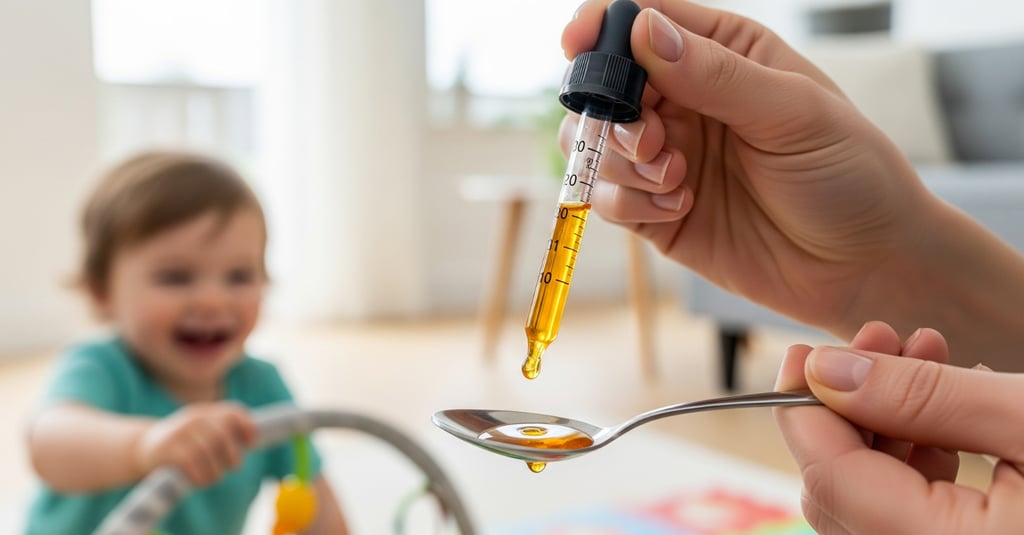Children’s Dosing & Palatability: Making Kids’ Supplements Parents Trust
5 min read


Understanding Age-Appropriate Dosing
Age-appropriate dosing for children’s supplements is crucial for ensuring both safety and efficacy. Children's bodies differ significantly from adults in size, weight, and developmental stage, and thus their nutritional needs and responses to supplements are uniquely individualized. Dosing guidelines typically take into account these variables, emphasizing the need for medications and supplements to be tailored according to a child's age, weight, and specific health requirements.
For instance, infants and toddlers require smaller doses due to their lower body weight and developing organ systems, whereas older children may need higher doses to support their growth and activity levels. The differences in metabolism among age groups can also affect how supplements are absorbed and utilized by the body. Therefore, it is essential for parents to adhere to age-appropriate dosing in order to avoid under-dosing or overdosing, both of which can lead to negative health outcomes.
Common challenges arise for parents when determining the correct dosage for their children. Many parents may find it daunting to interpret packaging instructions or may be unaware of the recommended dosing for certain age groups. Furthermore, variations in formulations, such as liquids versus gummies, can lead to confusion regarding the appropriate amount. To navigate these concerns effectively, consulting with healthcare professionals is highly advised. Medical practitioners or pharmacists can offer personalized recommendations based on a child’s health profile and unique needs, ensuring that parents can accurately provide the necessary supplements.
Additionally, adherence to regulatory standards regarding pediatric dosing cannot be overstated—these guidelines exist to safeguard against potential risks associated with improper dosing. Reliable sources, along with professional guidance, are essential for supporting parents in making informed choices that align with safety and health best practices.
Ensuring Developmental Safety in Children's Supplements
When it comes to children's supplements, ensuring developmental safety is paramount. Parents naturally want the best for their children, and this includes the supplemental products they choose. Proper dosing is critical, as children are more sensitive to variations in concentration and dosage compared to adults. Mistakes in dosing can have harmful consequences, including toxicity or inadequate nutritional support. Therefore, it is essential that manufacturers adhere to established guidelines to determine appropriate dosages based on a child's age, weight, and nutritional needs.
Rigorous testing is another cornerstone of safety in children's supplements. This involves both pre-market assessments and ongoing quality control practices. Ingredients must be thoroughly evaluated to ensure they are safe and effective for children. Furthermore, it is vital that supplements are free from harmful substances, such as heavy metals, allergens, and other contaminants that could pose risks to a child's health. Pediatricians often recommend that parents look for products that are third-party tested, as this external verification can provide an additional layer of assurance regarding safety and efficacy.
In Canada, stringent regulations oversee the safety of children’s products, including dietary supplements. The Natural and Non-Prescription Health Products Directorate (NNHPD) regulates the quality and safety of these supplements, ensuring that they meet specific standards before being allowed on the market. Additionally, labels must include clear information regarding ingredients, potential allergens, and dosage instructions. Understanding these safety measures can empower parents to make informed choices when selecting supplements for their children. Ultimately, prioritizing developmental safety in children’s supplements not only protects children’s health but also builds trust between manufacturers and parents, fostering a positive image in the supplements industry.
Flavor Masking: Making Supplements Acceptable for Kids
Flavor masking is a crucial aspect in the formulation of children's supplements, as palatability significantly affects the willingness of kids to consume these products. Children can be quite particular about tastes, and unappealing flavors may lead to non-compliance, making it vital for manufacturers to employ effective flavoring techniques. Various approaches exist to enhance the sensory appeal of supplements, ensuring that children take them willingly and regularly.
One common method used in flavor masking is the incorporation of natural fruit flavors such as berry, citrus, or tropical fruit essences. These flavors not only resonate with children's taste preferences but also support a perception of healthiness. On the other hand, artificial flavors are often employed to create a consistent product experience, which can be beneficial in achieving desired sweetness levels. The balance between natural and artificial options is essential, as parents increasingly seek out safe, health-conscious choices for their children.
Parents are encouraged to examine the ingredients of children's supplements carefully. Selecting products that utilize natural flavoring options can provide the added reassurance of safety. Furthermore, understanding the balance between sweetness and essential nutrients enhances the overall supplement experience for children while addressing parental concerns. Many products today are designed to enhance flavor without compromising nutritional value, utilizing natural sweeteners such as stevia or monk fruit instead of processed sugars.
In addition to flavor, the texture and form of supplements can play a significant role in their acceptance. Chewable tablets, gummies, and liquid formats that exhibit pleasant mouthfeel can further encourage compliance. By integrating appealing flavors with engaging textures, manufacturers can create a product that not only meets children’s nutritional needs but also supports the overall well-being of young users. The combination of sensory appeal and thoughtful formulation leads to an increased likelihood that children will take their supplements as intended, promoting better health outcomes.
Child-Friendly Supplement Formats: Chewables, Liquids, and More
In the realm of children's supplements, various formats exist to accommodate the diverse preferences and needs of children. Among these formats, chewables, liquids, and gummies are particularly popular due to their appeal and suitability for young consumers. Each format possesses distinct advantages and drawbacks, which must be carefully evaluated to ensure effective supplementation.
Chewable supplements are often favored by parents and children alike for their palatable flavors and fun shapes. These formats allow for easy consumption, often eliminating the need for water. However, there can be challenges regarding dosage accuracy, as children may be inclined to chew more than the recommended amount, leading to potential overconsumption. It is essential for parent-educators to monitor these situations closely to maintain safe practices.
Liquid supplements stand out for their ease of administration, particularly for younger children who may have difficulty swallowing tablets. They are also versatile, as they can often be mixed with food or beverages. However, dosage can become tricky with liquids, as an imprecise measurement can lead to either underdosing or overdosing. Parents should be diligent in utilizing measuring devices to ensure the effectiveness of the supplements.
Gummies have emerged as an innovative format, combining the appeal of candy with health benefits. These tasty options often encourage children to adhere to their supplement routine. Nonetheless, gummy supplements can also pose a risk of overconsumption, as their candy-like nature may lead children to consume them without parental supervision. Furthermore, some gummies may contain added sugars, which could be a point of concern for health-conscious parents.
At Solnutra, we excel in creating tailored pediatric formulations that prioritize the unique preferences and requirements of children. By merging taste with nutritional benefits, we aim to simplify the supplementation journey for both parents and children, fostering a positive approach towards maintaining healthy habits.
